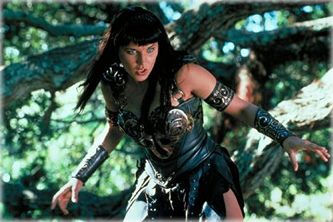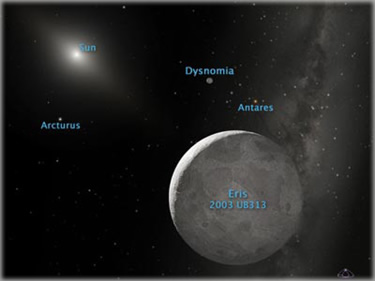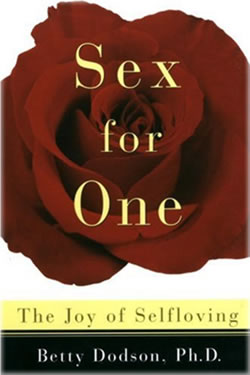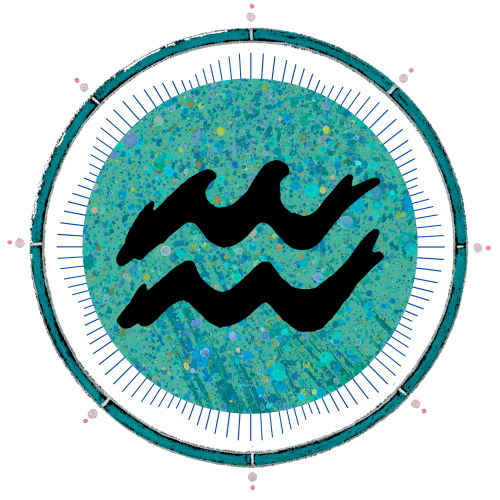Dear Friend and Reader:
IN THESE DAYS, the Sun is making conjunctions to the natal Eris of just about every person walking the planet. Eris is now in Aries, where it first arrived in the 1920s and where it will be through the 2040s. For the first time, we have a major astrological factor where nearly every living person has the planet in the same sign.

She is the goddess of discord (in ancient Rome, she was called Discordia), and we surely live in a time of planetary chaos: of ideas, of history, and most significantly, of who we think we are. I believe that Eris represents the fundamental crisis of identity — and as I’ve discovered in the course of doing this article, gender identity.
First, let’s do a quick overview of Eris and her rather spectacular arrival in consciousness and astronomy. That arrival is essential to understanding her role in astrology — a role that, for the most part, astrology has not been looking at. It’s an old story that 99% of astrologers ignore new discoveries. I am sure there are few of them walking around muttering, “The jury is still out on Pluto.”
The basic Eris story is that a discovery team consisting of Mike Brown, Chad Trujillo and Dave Rabinowitz photographed something way out there in 2003, but did not immediately take notice of the discovery. In 2005, Mike realized it was a planet, recording a discovery time of 11:20 am on Jan. 5, 2005 in Pasadena. Considered one of the world’s preeminent astrophysicists, Mike told The New York Times that he looked at his watch and recorded the time of his discovery because he knew astrologers would ask him. Hence, the lead discoverer not only possessed none of the difficult-to-fathom animosity that astronomers are so famous for harboring toward astrologers; to make things even more fun, he recently announced to his colleagues that he loves astrologers. We ran his article in Planet Waves.
This bit factors into the story too, because we have a rare example of an astronomer willing to break the mold, forget idiotic prejudices and do what he wants. He can afford to — he has his place in history, but more to the point, he has an open mind.
Mike and team gave their discovery a provisional moniker, Xena, named for the warrior-princess TV character. Why did they do this? Well, when the same team discovered Sedna in 2003, they soon announced their choice for the official name before the formal naming rules allowed. They were subjected to a wet noodle lashing by their “higher-ups” at the committee that records planetary names. So when they found the planet that would become Eris, they created a working name for their discovery, Xena. But far from being inert, this name contained rich imagery and a lot of information.
It was named for a heroic woman, for one thing, apropos of a discovery in Aries. Xena could show up in Bethlehem for the birth of Jesus in one episode and in Egypt the next week. She was bisexual. She killed people. She was a kind of sorceress. I ran this past my writing partner Paloma Todd, and the first words out of her mouth were, “Oh, this planet is about postmodernism.”

Oh, really? I had been trying to figure out what that word meant since around the time I was in grad school in the 1980s. In the academic sense, the word “modern” does not mean “now.” Rather, it is a reference to the world after the advent of science. This was the world of nature having been conquered or at least decoded; the irrational world of religion having been debunked; a measure of order having been found in the chaos.
Science made a lot of progress doing things like reducing polio and smallpox, improving our quality of life and making machine guns, warplanes and atomic bombs easy to manufacture. We had a measure of order and mastery of nature — and we have paid a huge price for it. Part of that price involved some severe damage to the imagination; the advent of what Richard Tarnas calls the disenchanted world. And underneath, the chaos of the human psyche continued to exist.
In the postmodern world, the apparent order of the universe began to flake apart. I will give you an example. Most people still think that there are nine planets. Since the 1970s, nearly a quarter-million planets were discovered orbiting our own Sun. If astrology uses the planets to represent a model of the psyche, the nine-planet model was crumbling as an image of the orderly, tidy system that mainstream astrology was attempting to maintain.
Then Eris was discovered, and it turned out to be larger than Pluto. It was the first discovery of something that big since the discovery of Pluto itself in 1930. There are a lot of interesting planets out in that region of space, but they were all smaller than Pluto. Despite these discoveries, the astronomical community had never agreed on an official definition of the word “planet.” The new critters were called things like centaurs, cubewanos, plutinos, asteroids, oortoids, Kuiper objects, damocloids — but nobody knew what a planet was.
Eris did two things: forced the question of what a planet is or is not; and became the embodiment or representation of all those thousands of discoveries that never got the attention of the culture, and were (and remain) barely noticed by astrology.
It sometimes takes many years for the delineation of a newly discovered body to emerge, and we are not even two years into the age of Eris. But whatever you may think or not, whatever ideas you may have or not, the edge of the solar system has moved, and the new keeper of the brink is no longer the lord of hell and god of the underworld, Pluto (who in astrology is the lord of transformation and the compelling evolution of the soul). It is Eris, the goddess of discord (who in astrology is the messenger of postmodern consciousness).

On its own, it is significant that a major planetary discovery has been named for a goddess. Many goddesses are the namesakes of planets, but few are considered particularly important by astrology. In the traditional system, only one planet is named for a goddess, Venus.
The Moon (as we call it) represents Artemis, Selene, Luna and other goddesses — but we rarely call her by name, and indeed in most style guides, “the moon” is not even capitalized. When Eris came to prominence, she brought with her Ceres, a vastly important goddess whose name had been assigned to an 1801 planetary discovery. But when three other bodies were found in the same region, all four were given the term asteroid and have been barely mentioned by astrology since. Now, Ceres is no longer an asteroid, but is rather a dwarf planet along with Pluto and Eris.
Given that Eris of mythology represents an excluded woman, we might look to her for themes of female equality and its many struggles.
Chiron Conjunct Eris: The Feminist Watershed
How do you decipher the effect of a newly discovered planet? One way is you look at when a planet in question made a conjunction to another planet, and study the events of that era. This has an odd way of making things transparent.
I like to use Chiron for this kind of experiment because it tends to bring things into awareness. Chiron is not exactly neutral or inert, but it can faithfully raise awareness of whatever it is making contact with; it can reveal the essential strength or crisis of the other planet in question. This is one reason why I recommend that astrologers check several past Chiron transits before they attempt to read an astrological chart.
Between 1971 and 1972, Chiron in Aries made a series of conjunctions to Eris, so we have a phase of time we can use to test the theory of Eris’s effects. The conjunctions were exact May 30, 1971, Sept. 8, 1971 and March 19, 1972.
 Many things occurred during that era, but for sure it was the watershed of modern feminism. Feminism is not just about women’s rights. It is about deconstructing the known order of the world, which tends to largely be based on gender roles. When you suspend or even question gender roles, you basically get a form of chaos. It’s impossible to see the extent to which people cling to those roles until you take them away for a moment or two.
Many things occurred during that era, but for sure it was the watershed of modern feminism. Feminism is not just about women’s rights. It is about deconstructing the known order of the world, which tends to largely be based on gender roles. When you suspend or even question gender roles, you basically get a form of chaos. It’s impossible to see the extent to which people cling to those roles until you take them away for a moment or two.
Warming up the territory was Kate Millet’s book Sexual Politics. When this book appeared in 1970, it was explosive, emerging in a time when intellectual ideas still made a difference in popular culture.
Wikipedia sums it up: “In the book Millet argues that ‘sex has a frequently neglected political aspect’. It goes on to discuss the role that patriarchy plays in sexual relations, looking particularly at the works of D. H. Lawrence, Henry Miller, and Norman Mailer. Millet argues that these authors view and discuss sex in a patriarchal and sexist way.” In particular, their portrayal of women as inferior, disposable, and lacking any mental content is what Millet was going after.
She may be the first person who described the relationships between the genders as political in nature. “This essay does not define the political as that relatively narrow and exclusive world of meetings, chairmen, and parties,” Millet wrote. “The term ‘politics’ shall refer to power-structured relationships, arrangements whereby one group of persons is controlled by another.”
It is difficult to conceive today how explosive these words were at the time. They quite literally deconstructed concepts of gender relations, defining them in an entirely different way, and at the same time, undermining the basis of society’s main structure.
My personal favorite bellwether of this era is Betty Dodson, author of Sex for One. Betty said that in this phase of her life, she had bailed out of her career as a fine art painter to become a feminist; soon after leaving traditional feminism behind because it was over-politicized, boring and anti-sex.

I called her Thursday and asked if the years 1971 and ’72 rang a bell. She said that in 1971, she gave her first all-women’s masturbation workshop. “I thought that if women did not learn how to have orgasms and be sex positive, they would abuse their power just like men,” which she laments is precisely what happened.
“And the poor guys — the only way they can get any sexual release is to hire a hooker to give them a blow-job. Then they lose their career. That’s a high price to pay for something that’s healthy and natural.”
Notably, Betty was, in that era, one of the few feminists who openly supported erotic art, pornography, masturbation and sex. She ran consciousness-raising groups, and she hosted many orgies in her Madison Avenue apartment.
Ms. Magazine was founded by Gloria Steinem and others in 1971 and became the first national feminist magazine. It was published on a monthly basis beginning July 1972. Shortly after going into business, Ms. commissioned Betty to write her first article on masturbation. Due to the “controversial” nature of the subject, it took more than two years and about a dozen complete rewrites to finally be published, appearing in its final form as what Betty described as a personal confession.
However, it had a huge impact on the audience. She got thousands of requests for more information, which led to her creating the pamphlet Liberating Masturbation. This eventually became Sex For One.

In 1972, an art installation called “Womanhouse” opened at the California Institute of the Arts. This was led by Judy Chicago and Miriam Schapiro. The rooms were decorated as commentary on women’s position in the home. Famous installations included “Menstruation Bathroom” (Judy Chicago), “Linen Closet” (Sandy Orgel), and “Nurturant Kitchen” (Susan Frazier, Vicki Hodgetts, Robin Weltsch).
Also in 1972, the Lesbian Herstory Archives was established in Manhattan, documenting the history of lesbians. In its current statement of purpose, the archives states: “We will collect and preserve any materials that are relevant to the lives and experiences of Lesbians: books, magazine, journals, news clippings (from establishment, Feminist or lesbian media), bibliographies, photos, historical information, tapes, films, diaries, oral histories, poetry and prose, biographies, autobiographies, notices of events, posters, graphics and other memorabilia.”
In 1973, Erica Jong came out with Fear of Flying, which tells the story of a woman in search of an emotional orientation outside her marriage, and then of the “zipless fuck.” Written precisely during the Chiron-Eris conjunction, it’s recognized as one of the most frank and uninhibited fictional stories on sexuality from a female perspective. To wit:
And what about those other longings which marriage stifled? Those longings to hit the open road from time to time, to discover whether you could still live alone inside your own head, to discover whether you could manage to survive in a cabin in the woods without going mad; to discover, in short, whether you were still whole after so many years of being half of something (like the back two legs of a horse outfit on a vaudeville stage).
Five years of marriage had made me itchy for all those things: itchy for men, and itchy for solitude. Itchy for sex and itchy for the life of a recluse. I knew my itches were contradictory — and that made things even worse. I knew my itches were un-American — and that made things still worse. It is heresy in America to embrace any way of life except as half of a couple. Solitude is un-American. It may be condoned in a man — especially if he is a “glamorous bachelor” who “dates starlets” during a brief interval between marriages. But a woman is always presumed to be alone as a result of abandonment, not choice. And she is treated that way: as a pariah. There is simply no dignified way for a woman to live alone. Oh, she can get along financially perhaps (though not nearly as well as a man), but emotionally she is never left in peace. Her friends, her family, her fellow workers never let her forget that her husbandlessness, her childlessness — her selfishness, in short — is a reproach to the American way of life.
Even more to the point: the woman (unhappy though she knows her married friends to be) can never let herself alone. She lives as if she were constantly on the brink of some great fulfillment. As if she were waiting for Prince Charming to take her away “from all this.” All what? The solitude of living inside her own soul? The certainty of being herself instead of half of something else?
The same year, Adrienne Rich came out with Diving into the Wreck: Poems 1971-1972. Using the experience of diving as a metaphor, Rich descends into human consciousness, discovering its fundamentally androgynous nature, carrying a knife, a camera and a book of myths “in which our names do not appear.”
Finally in 1973, the U.S. Supreme Court decision Roe v. Wade legalized abortion based on the right to privacy. This secured the most important right that a woman can have — that of control over her own body and the choices she makes that influence its life. The case was decided in 1973, but was argued in 1971 and 1972, at the peak of the conjunction.
Chaos in the Land
I think we have a pretty solid case for Eris representing the emergence of feminist consciousness, at least when put under the human potential magnifying glass of Chiron. Let’s look at some of the darker developments of that era, briefly, which certainly give the feeling of chaos and discord that pervaded the times.

January 1971: The Manson murders were big news; Charlie and friends were found guilty: Mason, Krenwinkel and Atkins on seven counts of murder and one of conspiracy; Van Houten was convicted on two counts of murder and one of conspiracy. The four were later sentenced to the death penalty, which sentence was commuted.
June 30, 1971: The crew on the world’s first manned space station, the Soyuz 11, is killed when the station’s air supply leaks out through a faulty valve.
Sept. 9-13 1971: Attica prison riots in Western New York. According to one summary: “If we cannot live as people, then we will at least try to die like men,” declared the prisoners’ spokesman. A thousand inmates had taken over Attica prison in upstate New York in September 1971 and held 43 hostages for four days. Over those four days, negotiations for an end to the siege crumbled. On September 13 state troopers stormed the fortress in a bungled rescue operation and killed 39 people. It was the bloodiest prison uprising in American history. How was such a disaster even possible?
June 1972-August 1974: The Watergate scandal, which in effect demonstrated that government on the highest levels is a sophisticated form of anarchy. It involved not just a break-in of the Democratic National Committee headquarters, but the theft of the 1972 election and the use of the FBI, the IRS and other government agencies in a “dirty tricks campaign” aimed at Nixon’s enemies.
September 5-6, 1972: Munich Massacre takes place, wherein 11 Israeli athletes at the 1972 Summer Olympics in Munich were murdered. This was after eight members of the organization Black September invaded the Olympic Village. Five guerillas and one policeman were also killed in a failed hostage rescue.
Learning Something About Eris
You can see from this essay a little of how it’s possible to discern what a planet is about. We start with some imagery from the two names (Xena and Eris), factor in some context of the discovery of the planet, and then look to real life.
In the early 1970s, when Chiron came along and put Eris under a microscope, society shifted. It was like the Sixties came to a pointed, shocking conclusion. We witnessed one of the most incisive critiques of the 20th century, in the form of feminist thought. This is postmodern because it involved a deconstruction of the known order of reality, and on the most personal level as well. We witnessed a rare and in some ways short-lived feminist uprising, a broad female critique of society through art, literature, workshops and consciousness raising.
On the male side of the gender divide, we had the most memorable presidential scandal fueled by paranoia and greed for power.
Manson’s clan primarily murdered women, which can be viewed as a desperate male attempt to control women in an age where that’s becoming impossible: “we have birth control, we can fuck who we want, we don’t have to keep the baby, we have abortions legally now,” in the words of Rachel Asher, who researched much of this article. Unfortunately, the cultural value on those important social gains is being rapidly eroded by Neoconservatism.
Men staged an uprising at a notorious prison and attacked the Olympic Village — the very emblem of world peace.
While feminists were doing their thing, there was a crisis of masculinity in the works. Feminism was given a name and blamed for all of society’s woes. The crisis of masculinity was not named, and while the finger was pointed, nothing much changed.
In Aries fashion, events of this era brought together the personal with the political in the form of deep questioning of one’s role in society — down to the biological level.
The Chiron-Eris conjunction of 1971-72 happened on the heels of the Uranus-Pluto conjunction, which was exact in 1965-66. That conjunction broke up the big chunks and let a lot of raw energy pour through, so that the subtler bits, such as a feminist critique of society and the individual’s role there, could emerge. In these eras, people asked questions that we don’t dream of asking today.
![]()

Weekly Horoscope for Friday, March 28, 2008, #707 – By ERIC FRANCIS
Aries (March 20-April 19)
The particular challenge, as the Sun makes a conjunction to the eminent asteroid Pallas Athene, is exploring the balance between your masculine and feminine sides. In the current version of the world, there always seems to be a tradeoff. Women who have risen to positions of influence are typically made to sacrifice — at least temporarily — an aspect of their femininity. Men who have opened themselves up to an inner life, to vulnerability, or to dedication to service, seem required to let go of an element of their masculinity. These exchanges often involve personality traits or gender roles, but at the moment there is a deeper alchemy involved; a dedication to experiencing life from another viewpoint and being changed in the process. At first it may feel strange, but not for long.
Taurus (April 19-May 20)
Every now and then, actual progress comes upon you quickly, and you go with it. (For a Taurus, there are a lot of other possibilities.) This would be your week, but you will need to do a few things if you want to take advantage of the fair winds. One is make your strategy conscious. Currently it’s lurking in the background, too large to see, or too foggy to discern. Second, you need to build on what you’ve accomplished and at the same time bring in a large element of something entirely new. Last, it would help a lot if you had faith in your own ideas and their positive influences on others. I know this may sound a little skeptical, even though the astrology is not holding back in any way. The problem is that this week’s alignment between Jupiter, Chiron, Uranus and your planet Venus looks so positive, you may not believe it. The only “it” you need to believe in is yourself.
Gemini (May 20-June 21)
Devote yourself to the art of compromise and you’ll come out with far more than what you think is your fair share. Lead the way. Embody the principle of the greatest good for all concerned, and trust the results. Look more closely at those who seem to come out on the losing end of an agreement and you will see what they have gained that you would not have otherwise noticed. Look at those who seem to gain the most and notice the ways in which they seem no better for the experience. In this world it’s easy to make up simplistic stories about why some people deserve to win and others deserve to lose. Go beyond those, to the deeper underlying truth that the benefits of life are not distributed evenly, no matter how hard anyone tries. You stand to gain enormously in the coming days. Be honest with yourself and those around you, and take at least one opportunity to be fair when you don’t have to be.
Cancer (June 21-July 22)
During the next two weeks, you have the power to set in motion a sequence of events that reaches out on a far greater scale than you’re accustomed to. The results may seem like the manifestation of luck, which is true if you count circumstances involving years of preparation and dedication as such. Allow the luck factor to be about protecting you from your own errors, or your tendencies to be hot headed and pushy just at the wrong moment. Make it a habit to understate your case, and to invest your energy into sizing up the positions of the pieces on the chessboard rather than moving them around willy-nilly. Decide what benefit you need, desire or require from one particular situation, and set your boundary right there. Ensuing developments involve a significant degree of public benefit; take a step back from that, and remember every moment how blessed you truly are.
Leo (July 22-Aug. 23)
Spiritual training is one of the best habits a human can acquire. I mean specifically cultivating two traits: one is compassion, and the other is seeking inwardly for your answers. Follow these two practices like yoga and you cannot go wrong. Spiritual training is, at its most basic, a conscious strategy for living. We make certain decisions in advance about how we’re going to respond when presented with common situations or challenges. Too often, these strategies are imposed on us, representing alien or unoriginal values, or worse, values that are self-defeating. I suggest that you stay close to your core principles, and make every effort to look through the images and mirages of the world and make contact with the deeper levels of human experience. If you keep your mind and soul in alignment, the results will radiate out like a sphere of protection for many miles around you.
Virgo (Aug. 23-Sep. 22)
Isn’t it fascinating how the same influences that so recently seemed brash or unattractive today seem poetic, beautiful and like a blessing? Well, everyone has grown and changed; what initially seemed like raw energy has gone through a process of refinement. Yet you would probably not have responded at all had you not been subjected to a few shocks to your sensibilities. Beauty, love and that peculiar thing called art are only meaningful if we notice them, and for a while, you were dangerously risking not noticing at all. The result is that you’ve gradually arrived in a state of balance between noticing and creating; between feeling and expressing; between existence and action. Now you can reach for much greater things than you’ve ever dreamed possible. But please bear in mind, as I am pretty certain you do, that the greatest achievement of all on this planet is a community where everyone eats, has shelter, and space to enjoy life for its own sake.
Libra (Sep. 22-Oct. 23)
In any question involving a professional matter, remember that you will never be satisfied in a career that does not nourish others. Take the concept of nourish as broadly or as narrowly as you like, but make sure that you have tangible evidence. This being said, you may notice that certain others in your environment have a distinctly different plan. It can be quite difficult to discern what a person’s agenda is, but if you track a series of their decisions, actions or the ideas they express, you will see a pattern. And that pattern may clash directly with your agenda even if you deny having one. You do, and you need to know exactly what it is. You will make some significant discoveries based on the ways you come into conflict with others during the coming days, and you will gain immeasurably as you resolve to live your life your way. And if this comes down to a career decision of some kind, keep this whole equation in mind.
Scorpio (Oct. 23-Nov. 22)
One of the most brilliant talents a person can develop is learning to get out of their own way. Try it. You are a talented, creative person by nature, but you have a little tendency to get hung up on your concepts of what life is supposed to be like, the order things are supposed to happen in, and an attachment to the results you’re expecting. Those are the things you need to set aside. They have exceedingly little basis in truth, but they also block access to your deeper talents. You need structure in your life, but most of the time you suffer from too much rather than too little. So ease up on your expectations; visualize the results as starting as a clean canvas rather than as a preconceived idea; and make room for the existence of a plan more beautiful than you can imagine. Then, follow your intuition and do your small part — but nothing more.
Sagittarius (Nov. 22-Dec. 22)
You have reached a significant checkpoint in the long cycle of your personal development. I am doing my best to understate the case. If you investigate your life in some detail, you will notice that your relationships are growing; your talents are developing; you have found a way to live authentically and even independently that does not threaten the people around you. Your strategy has long been to not care what other people think — or so you feign. You actually care, but you cultivated the maturity to not let it bother you. Now something much more facilitating of intimacy is developing: a devotion to sensitivity. You may want to ask yourself why you felt so deeply, for so long that if you were truly empathic of the plight of others, you would somehow lose your identity or individuality. The truth is, once you have these things, you can’t actually lose them. Yet you don’t know till you get there.
Capricorn (Dec. 22-Jan. 20)
At the core of every human being is a well of sorrow, yet this is the water that nourishes life. You are learning to make contact with your own sadness, your own sense of loss and most of all, the fact that the time span of every human life and every human relationship is limited. This is the mark of true maturity; of true humility; and from this viewpoint, it is possible to embrace your existence and your relationships consciously. If you are wondering why you suddenly have more to offer the people around you, why you are feeling more generous, and why you take your own needs less seriously, I would propose that it’s the result of some deep and unusual growth. Existence is indeed fragile, and to the extent a human being can express any strength at all, it’s often the result of embracing the delicacy we all share.
Aquarius (Jan. 20-Feb. 19)
Recognize how much you have and you’ll realize you need very little else. For the foreseeable future, your life is an exercise in making the best use of your existing resources. You have so much, and so many options. I understand that the prevailing values of the world are designed specifically to conceal this fact; our economy (for example) is driven on the false perception of need, and our identities are shaped on a false sense of lack. Therefore, recognize the extent to which your personal choices represent an insurrection against something much larger than yourself. The beauty of this moment is that you require nobody’s consent or approval to live your own way. I am aware that there are certain people who are currently attempting to play a controlling role, but in truth they have no more substance or influence than a shadow.
Pisces (Feb. 19-March 20)
You sometimes have a tense relationship with freedom, but you need to relax and embrace the world; embrace yourself; let your guard down and let the rewards of life in. People are treating you with greater beneficence than you may imagine. I recognize that you have your reasons to be guarded, one of which is your own tendency to give yourself away until there is nothing left to give. You are often seen as the fount of all gifts, mainly because you possess the resource of deep sensitivity, and you’re usually not the type of person who wants to say no. I don’t need to say that this is in a world of people who seem to adore saying no, or worse, giving no response at all. Let that harsh conditioning go. Open your eyes and look at people’s faces, listen to their words, and feel your intuition saying yes.



